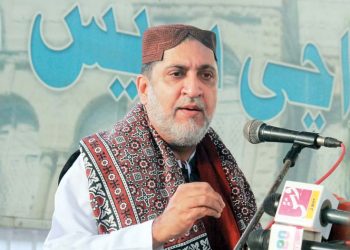President Arif Alvi on Thursday wrote a letter to the Ministry of Law and Justice to seek “advice” on the Election Commission of Pakistan’s (ECP) letter contending that the head of the state is no longer empowered to fix the polls’ date.
In a statement on X, formerly known as Twitter, the President House said that Alvi has written the letter to the ministry’s secretary on the ECP’s response with regard to the letter he had sent for a meeting to decide the election date.
On the other hand, Caretaker Law Minister Ahmad Irfan Aslam Ahmed Irfan Aslam has said that they are yet to receive the said letter from the president.
“We will send a response in light of the applicable laws once we receive the letter,” Aslam told Geo News.
President not authorised to fix election date, ECP tells Alvi
Earlier today, the ECP responded to President Alvi’s letter — in which he had invited Chief Election Commissioner (CEC) Sikandar Sultan Raja — stating he was no longer empowered to fix the date for polls after amendments in election laws.
The development came in a meeting chaired by CEC Raja to ponder over the matter and concluded that the meeting would be of “scant consequence”.
Dr Arif Alvi, in the letter to the CEC, said since the National Assembly was dissolved on August 9, 2023, under Article 48 (5) of the Constitution, he (as the president) was obliged to appoint a date not later than 90 days from the date of dissolution for the holding of general election of National Assembly.
“Forgoing in view, the Chief Election Commissioner is invited for a meeting with the President today or tomorrow to fix an appropriate date,” the letter noted.
In his response to the president, CEC Raja stated that the National Assembly was dissolved in terms of Article 58(1) of the Constitution on the advice of the prime minister on August 9, 2023.
The letter pointed out that Section 57 of the Elections Act, 2017 has been amended after which the ECP’s authorities have been increased regarding holding of polls.
“That prior to the amendment of Section 57(1) of the act ibid, the president was required to consult the commission in terms of Section 57 of the Elections Act. 2017, before appointing a date for the election. However, after the amendment in Section 57, the commission has been empowered to announce the date or dates for the General Elections,” the letter read.
It further stated that the president can fix a date for election if the NA under Article 58(2) read with Article 48(5) of the Constitution.
The Election Commission noted that if the assembly is dissolved on the advice of the prime minister or by afflux of time as provided in Article 58(1) of the Constitution, then the commission understands and believes that power to appoint a date or dates for elections rests exclusively with the commission.
“The commission believes with the utmost respect that the reliance placed on the provisions of the Constitution mentioned in your subject letter are not applicable in the present context,” the letter added.
The CEC also highlighted the issue of fresh delimitation after the approval of the 2023 census result which he said “is one of the foundational legal steps towards election”.
“In pursuance of the last preceding census officially published on August 7, 2023, the commission decided to carry out fresh delimitation of constituencies as provided under section 17(2) of the Elections Act, 2017, to protect the fundamental rights of contesting candidates, political parties and electorates as guaranteed under Article 17(2) of the Constitution.”
In response to the criticism over the delay in polls, Raja said that the ECP is taking its responsibility of holding the general election very seriously and has also initiated the process of inviting the major political parties to hear them on the electoral roadmap.
“In view of the above, the commission is of the considered view that participation in the meeting would be of scant consequence.”














































